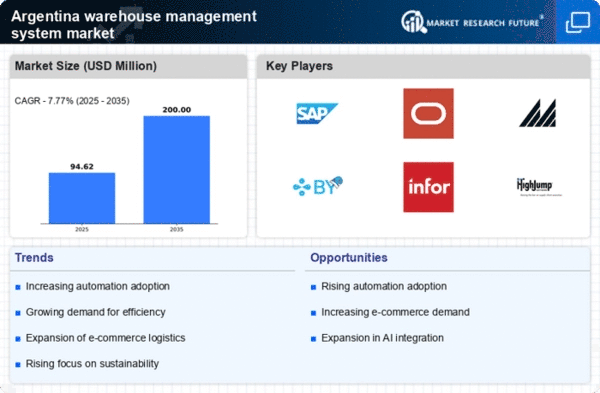Growth of E-commerce and Retail Sectors
The expansion of the e-commerce and retail sectors in Argentina significantly influences the warehouse management system market. With online sales projected to increase by 20% annually, businesses are compelled to adopt advanced warehouse management solutions to handle the rising volume of orders efficiently. The need for real-time inventory tracking and automated order processing is paramount, as consumers demand faster delivery times. Consequently, companies are investing in warehouse management systems that can seamlessly integrate with their e-commerce platforms, ensuring a smooth flow of goods from warehouses to customers. This growth trajectory indicates a promising future for the warehouse management-system market.
Technological Advancements in Logistics
Technological advancements play a crucial role in shaping the warehouse management system market in Argentina. Innovations such as artificial intelligence (AI), machine learning, and the Internet of Things (IoT) are transforming traditional warehouse operations. In 2025, it is estimated that 30% of warehouses in Argentina will implement AI-driven solutions to enhance inventory accuracy and optimize space utilization. These technologies enable businesses to analyze data in real-time, leading to informed decision-making and improved operational efficiency. As logistics companies increasingly adopt these technologies, the warehouse management-system market is likely to witness substantial growth.
Rising Demand for Efficient Supply Chains
The warehouse management system market in Argentina experiences a notable surge in demand for efficient supply chains. As businesses strive to enhance operational efficiency, the need for advanced warehouse management systems becomes increasingly apparent. In 2025, the logistics sector in Argentina is projected to grow by approximately 6.5%, indicating a robust market for solutions that streamline inventory management and order fulfillment. Companies are investing in technologies that optimize warehouse operations, reduce lead times, and improve customer satisfaction. This trend suggests that organizations are prioritizing the integration of sophisticated warehouse management systems to remain competitive in a rapidly evolving market.
Regulatory Compliance and Safety Standards
The warehouse management system market in Argentina is also driven by the need for regulatory compliance and adherence to safety standards. As the government enforces stricter regulations regarding workplace safety and environmental sustainability, businesses are compelled to invest in warehouse management systems that facilitate compliance. In 2025, approximately 40% of companies are expected to prioritize systems that ensure adherence to safety protocols and environmental regulations. This focus on compliance not only mitigates risks but also enhances the overall reputation of businesses in the logistics sector, thereby driving demand for advanced warehouse management solutions.
Increased Focus on Sustainability Practices
Sustainability practices are becoming increasingly important in the warehouse management system market in Argentina. As consumers and businesses alike prioritize environmentally friendly operations, companies are seeking warehouse management solutions that minimize waste and optimize resource utilization. In 2025, it is projected that 25% of warehouses will implement sustainable practices, such as energy-efficient systems and waste reduction strategies. This shift towards sustainability not only aligns with The warehouse management-system market. Consequently, the demand for warehouse management systems that support sustainable operations is likely to rise.
















